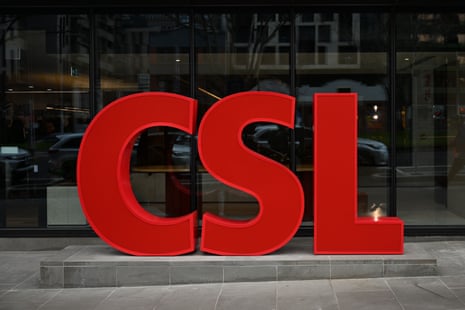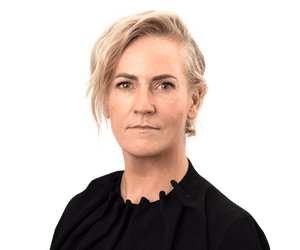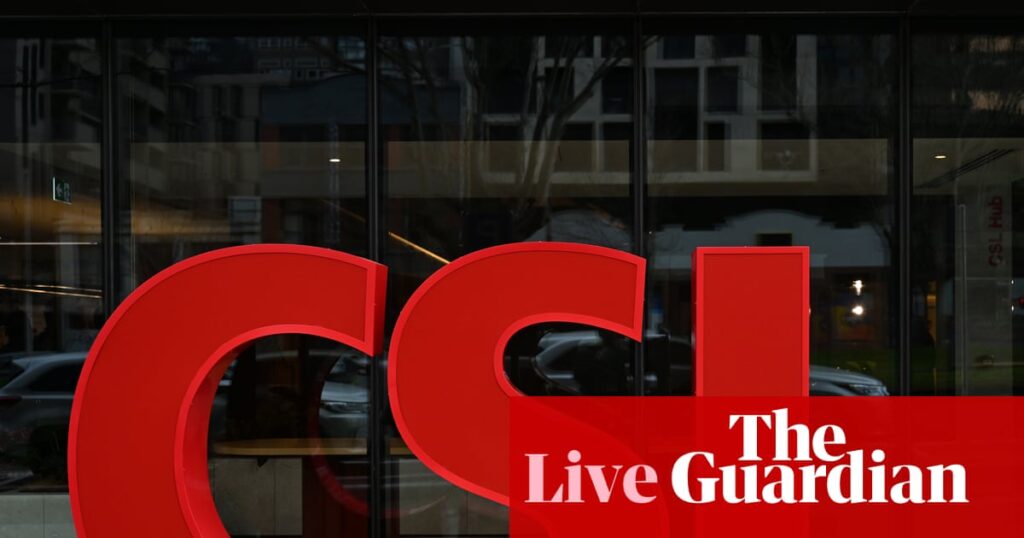CSL says Trump tariffs won’t touch pharmaceuticals, but shares plummet
Luca Ittimani
Australia’s largest biotech company, CSL, says it expects to avoid Donald Trump’s pharmaceutical tariffs, but its share prices have plummeted anyway.
The company today released its annual report and announced a restructure, splitting out its vaccine production arm and sacking thousands of staff. Revenue for 2024-25 came in lower than expected, although profits beat analyst expectations, rising 14% to US$3.2bn on an adjusted basis.

The US president has threatened tariffs and crackdowns on pharmaceutical imports, potentially including those from Australia-based CSL, but the company expects its blood plasma and other products should manage to get an exemption. CSL’s chief executive, Paul McKenzie, told investors:
The plasma is sourced all in the US … [and] for many other parts of our portfolio, the active pharmaceutical ingredient is actually sourced in the US, as well. So, that would mitigate it. And for other parts of the organisation, we will look at our supply chain [and] where the products come from.
But investors didn’t like the revenue undershoot or the surprise restructure, selling the stock and driving the share price down $33, or 12%, which would be one of CSL’s biggest-ever one-day falls if sustained.
Key events
Penry Buckley
Major train delays in Sydney’s CBD after urgent track work
Passengers on some of Sydney’s busiest train lines face delays this afternoon, after an incident requiring urgent track repairs this morning.
There are delays across the T2 Leppington, T3 Liverpool and the city circle lines after an incident affecting the section between Town Hall and Central, Transport for NSW has advised.
⚠ Allow plenty of extra travel time due to urgent track repairs between Town Hall and Central earlier.
Stops may change at short notice.
Please listen for announcements, check information screens and transport apps before getting on trains. pic.twitter.com/mempchNh0Q
— T2 Sydney Trains (@T2SydneyTrains) August 19, 2025
Trains came to a standstill earlier, although a spokesperson for Sydney Trains said they have since resumed. Route planner TripView is showing services on both T2 and T3 lines from this morning running more than 90 minutes late, with current delays in both directions of travel.
Transport for NSW has advised passengers to allow plenty of extra time, warning that departure platforms may change at short notice.
Former RBA governor says Albanese government made him take cost-of-living blame
Former Reserve Bank governor Philip Lowe says the Albanese government pushed the blame for the rising cost of living on to the RBA and “fed into” his personal unpopularity.
Lowe oversaw 12 of the 13 interest rate hikes in 2022 and 2023 as the RBA fought inflation by increasing borrowing costs, and pushing mortgage payments higher just as Labor came to power. He left the bank in September 2023 when the government declined to extend his term.
The former governor said the government had pushed blame onto the bank and himself personally to avoid electoral punishment :
It’s much easier for the political class to say ‘things need to slow, we’ll get our central banks to do that, and they can take the blame’. I remember, there was a period that I was the most unpopular person in the country, at least according to the media, and the government kind of fed into that.
The central bank governor doesn’t get elected … so they can play the baddie. It’s much harder for the political class to play the baddie.
Lowe made the comments appearing in a talk with the UNSW Business School’s Richard Holden and the e61 think tank’s chief executive, Michael Brennan, advocating for a new framework to limit federal government spending ahead of the Albanese government’s economic reform roundtable.
Lowe said the RBA’s interest rate policy had pushed against profligate government spending much of his career because governments wanted to avoid public blame for living costs. He said:
We were exercising restraint, and the government was busily compensating people for the fact that things are so tough, adding to spending in the economy.

Josh Butler
Canavan says Nationals still considering position on net zero
Nationals senator Matt Canavan says his party is still considering its position on net zero, as he helps lead a party room discussion on the climate crisis measure reviled by many in the Coalition.
Canavan, who is hosting his own productivity roundtable tomorrow in parliament house about energy issues, said his party had been “forced” into supporting net zero under former Liberal prime minister Scott Morrison:
He never allowed a debate the joint party room. At least now, with the policy being up for review, hopefully that debate will occur, and I’m hoping that it will be informed by some very good work that we are planning to commission.
Canavan said it would take “a few more months to have the debate”, indicating there might not be an imminent timeline for a final decision – but with loud voices like himself, Barnaby Joyce and Michael McCormack opposing net zero, there is a direction of travel very clearly emerging for the Nationals.
Canavan was out front of parliament spruiking his own sideline event, which will run tomorrow in APH. He said former treasury officials, former representatives of major business groups, and economists would attend. We asked if we should call it the “rogue roundtable” or “shadow roundtable”, which Canavan laughed off.
With all the action from today’s summit occurring behind closed doors in the cabinet room, people like Canavan are looking to grab some attention while things are quiet.
CSL says Trump tariffs won’t touch pharmaceuticals, but shares plummet

Luca Ittimani
Australia’s largest biotech company, CSL, says it expects to avoid Donald Trump’s pharmaceutical tariffs, but its share prices have plummeted anyway.
The company today released its annual report and announced a restructure, splitting out its vaccine production arm and sacking thousands of staff. Revenue for 2024-25 came in lower than expected, although profits beat analyst expectations, rising 14% to US$3.2bn on an adjusted basis.
The US president has threatened tariffs and crackdowns on pharmaceutical imports, potentially including those from Australia-based CSL, but the company expects its blood plasma and other products should manage to get an exemption. CSL’s chief executive, Paul McKenzie, told investors:
The plasma is sourced all in the US … [and] for many other parts of our portfolio, the active pharmaceutical ingredient is actually sourced in the US, as well. So, that would mitigate it. And for other parts of the organisation, we will look at our supply chain [and] where the products come from.
But investors didn’t like the revenue undershoot or the surprise restructure, selling the stock and driving the share price down $33, or 12%, which would be one of CSL’s biggest-ever one-day falls if sustained.

Benita Kolovos
Victorian opposition leader denies shift in position on Suburban Rail Loop
Victoria’s opposition leader, Brad Battin, has denied the party’s position on the Suburban Rail Loop has changed.
Asked about Matthew Guy’s comments this morning, Battin says his position was “identical”. He went on:
The government have a responsibility right now, they could stop the project before December, before the holes have been dug. But should they not do that and they dig two holes in the ground, the project will continue but we want to make sure that it is in the best interest of Victorians.
Battin also added that he doubted tunnelling would begin on time, citing delays on other projects including the West Gate tunnel:
Let’s wait and see what happens when it comes to the boring machines, and if the government can get anything [done] on time. But we know the chances of that are quite unlikely.

Catie McLeod
Woodside CEO says company looks forward to ‘positive outcome’ from government on North West Shelf extension
We reported earlier on Woodside CEO Meg O’Neill’s frustrations the company hasn’t been granted final federal approval for its controversial plan to extend the life of a major gas plant in WA. Here’s more from her remarks:
O’Neill said timelines behind such decisions need to be considered to boost productivity. She said earlier:
It’s frustrating that we still don’t have the final federal improvement approval. Time frames are certainly something that needs to be considered when we’re thinking about how to lift productivity in Australia.
We know that the federal government understands how important the North West Shelf extension is for our communities, customers and our workforce, and therefore the nation and we look forward to a positive final outcome in the very near future.
As we have previously reported, the extension is expected to be responsible for about 87.9m tonnes of carbon dioxide equivalent every year in the decades ahead, after the gas has been exported and burned, according to Woodside’s own numbers.
O’Neill said this morning that Woodside recorded no “significant environmental impacts” during the half-year period and remained on track to achieve its near-term greenhouse gas emissions goals.

Tory Shepherd
How did the royal commission in South Australia come about?
After four women were killed in a single week in South Australia, the state government set up a royal commission into domestic, sexual and family violence in July last year.
Natasha Stott Despoja, former senator and ambassador for women and girls and founding chair of Our Watch, wrote in the foreword of the 664-page report that the commission received more than 380 submissions, held 48 public hearing sessions, more than 170 listening sessions, and consulted with hundreds more people.
She wrote that she had heard stories that would haunt her, and that the report was a “call to action” for SA, which has “lost its way” on domestic violence.
The recommendations include a national standard for responsible media reporting, a dedicated state ministerial portfolio, more resources for police, more accommodation, free healthcare for victim survivors, screening for non-fatal strangulation, and strategies to minimise harm to young people on social media from pornography, the manosphere and “incels”.

Benita Kolovos
Victoria opposition won’t stop work on Suburban Rail Loop if tunnelling starts before next election
The Victorian opposition spokesperson for transport, Matthew Guy, has confirmed the Coalition won’t stop work on the Suburban Rail Loop if tunnelling begins before the election.
Guy was opposition leader during the 2018 and 2022 elections. At the more recent poll, he pledged to pause the project and invest the funding into health instead.
But at an ABC forum on Tuesday morning, he told host Raf Epstein his position had changed:
If the project has commenced and the tunnels are half constructed, well, we can’t fill them in. It will cost us more to stop a project than complete it. So the project will then proceed. There’s no doubt about that. We’ll have to make sure that it’s managed appropriately. And unlike every other major project, it’s managed on time and on budget, which would be rare for this government to have.
The minister responsible for the loop, Harriet Shing, says three contracts totalling about $7bn have been signed and another is due soon:
We’ve got tunnel boring machines that are arriving later this year. They will be in the ground and doing their work next year.
Commissioner behind SA report says findings present ‘once-in-a-generation’ chance to address domestic violence
Natasha Stott Despoja, the commissioner of South Australia’s royal commission, called the report a “a once-in-a-generation opportunity for our state to address the issue of domestic, family and sexual violence in a way that we haven’t before”. She said that task would not be easy:
It will require leadership and I’m so pleased to hear the premier talk about the steward role and the governance piece that you’ve already accepted. It will require significant investment, reinvestment, or uplift in some things that already exist, but also the creation of new systems.
Stott Despoja said it was a significant day for the state, acknowledging that the recommendations would take time. She said:
This is not a tick and flick exercise. It’s not about implementing for the sake of it, it’s about getting it right. …
It’s time now for our state to act with courage and lead with courage. And I have every confidence we will.
Malinauskas says judicial system needs trauma-informed cultural change to deal with domestic violence cases
Peter Malinauskas has also flagged changes to how the judicial system handles domestic violence cases:
I think there’s a need for some cultural change within our judicial system when they contemplate how domestic violence cases are handled.
The idea that domestic violence victims would be physically in the same environment as the alleged perpetrator in the lead-up to a particular case or a hearing is not acceptable.
There are some practical recommendations around getting judicial officers to undergo some trauma-informed training that speaks to a cultural change.
Malinauskas said the South Australian government intends to respond to all royal commission recommendations by the end of the year.
‘Harrowing stories’: SA premier gives press conference on state’s inquiry into domestic violence
The South Australian premier, Peter Malinauskas, is holding a press conference to release the findings of the state’s royal commission into domestic, family and sexual violence.
The royal commission has made 136 recommendations. Malinauskas said the state government would consider and examine the recommendations before formally responding to them.
But the government has accepted seven of the recommendations immediately. These include the creation of a “stand-alone ministerial portfolio” and the creation of “a stewardship function within government”.
The government has also accepted a recommendation to engage with people who have lived experience of domestic, family and sexual violence as it continues to develop a comprehensive response to the commission’s report.
Malinauskas said the report contained “some pretty harrowing stories” and that change was desperately needed in response to their experiences.
Tragically we know one-in-four women and up to one-in-eight men at some point during the course of their life will experience this type of violence. That is wholly unacceptable in a modern liberal democracy such as ours, where we often espouse the virtues of the collectively held values that we aspire to.

Patrick Commins
Early view from the economics roundtable: optimism is in the air
We have an early view from inside the cabinet room, where the good and the great are discussing how to make Australia’s economy more resilient.
Shiro Armstrong, an economics professor at the ANU’s Crawford School of Public Policy, said he told attendees that we should not get sucked into the rising protectionist trade policies and that domestic policies should be aimed at providing the certainty and confidence that is increasingly at a premium globally.
Armstrong told Sky News he was impressed with the vibe in the room, which he described as “extremely constructive” and “very optimistic”.
“Everyone had time to talk. Nothing was rushed. And really collegial between all the different interests.”
A good start, at least before the roundtable moves on to thornier issues such as tax and regulation in the coming days.

Catie McLeod
Woodside CEO frustrated gas plant extension still waiting for final approval
The Woodside CEO, Meg O’Neill, says it is “frustrating” the resources giant has not got “final federal government approval” for its controversial plan to extend the life of a major gas plant in Western Australia.
O’Neill spoke to investors and journalists in a teleconference from Sydney after Woodside released its half-year financial results earlier this morning, posting a 24% drop in profits.
The underlying net profit after tax of Australia’s largest oil and gas producer fell to $US1.25bn (about $1.92bn in Australian dollars) in the six months to 30 June from $US1.63bn in the same period last year.
Woodside has been in the spotlight after the Albanese Labor government in May gave the green light for an extension for the company’s North West Shelf gas project on the Burrup peninsula to run for an additional 40 years, from 2030 to 2070.
Guardian Australia understands Woodside and the government are yet to reach a consensus on the conditions required for final approval of the project, which include limiting the impact of air emissions levels from the operation of an expanded on-shore Karratha gas plant.

Caitlin Cassidy
Government to strengthen TEQSA, the higher education regulator
The federal government will strengthen the powers of the higher education regulator in a bid to respond to “systemic risks” facing the sector.
The Tertiary Education Quality and Standards Agency (TEQSA) has not significantly changed since it was established 15 years ago to regulate the quality of higher education providers.
The minister for education, Jason Clare, said there was a “good argument that TEQSA needs better tools to be able to step in and act when it’s justified in the public interest”.
In the coming weeks, the government will release a consultation paper on how to modernise TEQSA “to better meet the standards students, staff and the community expect of our universities”.
Dr Mary Russell, chief executive officer of TEQSA, said governance failures, risks to student safety, questions of financial viability and the impact of new technologies pointed to the need for a legislative framework that “better supports TEQSA’s ability to respond quickly and proportionately to emerging, systemic, and acute risks”.
Who is Warwick Stacey – the One Nation senator who has resigned?

Krishani Dhanji
The resignation of a One Nation senator from NSW is a shock, but Warwick Stacey’s entry into parliament was a shock in and of itself.
The minor rightwing party, led by Pauline Hanson, wasn’t expected to gain a seat in NSW, giving it its equal-best result in an election.
But who is Stacey?
According to several bios (more of which you can read about here) Stacey was in the British army and became a troop commander with the Special Air Service regiment, and in Australia was a member of the Army reserve. Stacey also worked in the Middle East as a military consultant.
Quitting soon after entering parliament, Stacey hasn’t given his maiden speech, but in an address to the Senate (which parliamentarians can do before they give their first speech) he called Welcome to Country ceremonies and acknowledgment of Country addresses the “radical left’s progressive agenda to divide Australians”.
All four One Nation senators turned their backs in the chamber during the acknowledgment of country on the first sitting day of the new parliament.


